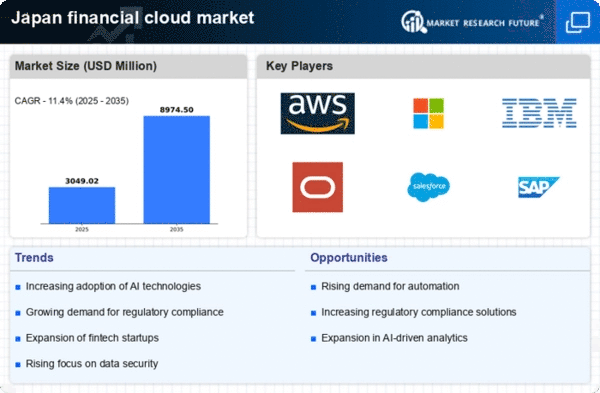Enhanced Security Measures
Security remains a paramount concern for financial institutions in Japan, particularly as cyber threats become increasingly sophisticated. The financial cloud market is responding to this challenge by offering advanced security solutions that protect sensitive data and ensure compliance with stringent regulations. Recent statistics indicate that approximately 70% of financial organizations in Japan are prioritizing investments in cloud security measures. This focus on security not only mitigates risks but also fosters trust among customers, which is crucial for the growth of the financial cloud market. As institutions adopt cloud solutions, they are likely to implement multi-layered security protocols, including encryption and real-time monitoring, to safeguard their operations. This emphasis on security is expected to drive further adoption of cloud services within the financial sector.
Growing Focus on Customer Experience
In the financial cloud market, enhancing customer experience is becoming a pivotal focus for institutions in Japan. As consumer expectations evolve, financial organizations are leveraging cloud technologies to deliver personalized services and improve customer interactions. The ability to analyze vast amounts of data in real-time enables institutions to tailor their offerings to meet individual customer needs. Recent surveys indicate that approximately 65% of financial firms in Japan are investing in cloud solutions to enhance customer engagement. This trend suggests that the financial cloud market is not only about operational efficiency but also about creating value through improved customer relationships. As firms continue to innovate in this area, the financial cloud market is expected to grow as a result of heightened customer-centric strategies.
Regulatory Adaptation and Compliance
The financial cloud market in Japan is significantly influenced by the evolving regulatory landscape. Financial institutions are required to comply with a myriad of regulations that govern data protection and privacy. As regulations become more stringent, the demand for compliant cloud solutions is likely to increase. Recent reports suggest that compliance-related investments in cloud technologies are projected to rise by 20% over the next few years. This trend indicates that financial organizations are actively seeking cloud providers that can ensure adherence to local and international regulations. The ability to navigate complex regulatory requirements is becoming a key differentiator for cloud service providers in the financial sector, thereby driving growth in the financial cloud market.
Rising Demand for Digital Transformation
The financial cloud market is experiencing a notable surge in demand driven by the ongoing digital transformation across various sectors. Organizations are increasingly seeking to enhance operational efficiency and customer engagement through cloud-based solutions. This shift is evidenced by a reported growth rate of approximately 15% in cloud adoption among financial institutions in Japan. As businesses strive to modernize their infrastructure, the financial cloud market is positioned to benefit significantly. The integration of cloud technologies allows for improved data management, scalability, and cost-effectiveness, which are essential for maintaining competitiveness in a rapidly evolving landscape. Consequently, the financial cloud market is likely to see continued investment as firms prioritize digital initiatives to meet the expectations of tech-savvy consumers.
Cost Efficiency and Resource Optimization
Cost efficiency is a critical driver for the financial cloud market in Japan, as organizations seek to optimize their operational expenditures. By migrating to cloud-based solutions, financial institutions can significantly reduce their IT costs, including hardware maintenance and software licensing fees. Reports indicate that companies can save up to 30% on IT expenses by leveraging cloud technologies. This financial incentive is compelling for many organizations, particularly in a competitive market where margins are often tight. Furthermore, the flexibility of cloud services allows institutions to scale resources according to demand, further enhancing cost management. As a result, the financial cloud market is likely to witness increased adoption as firms prioritize financial prudence while pursuing technological advancements.
















